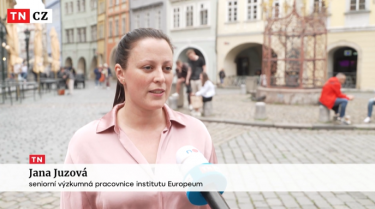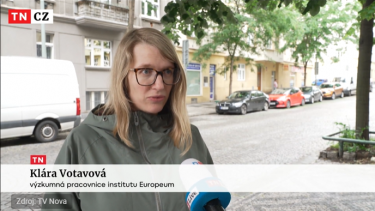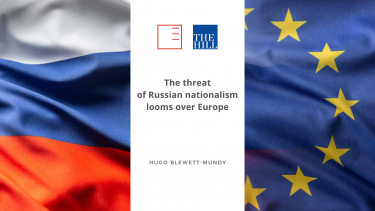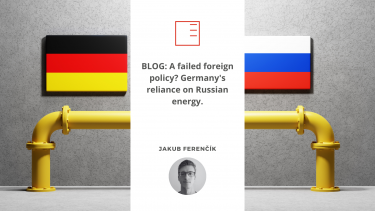TV Nova | Brussels will deal with the enlargement of the Union. Among the candidates are Turkey or Ukraine
The elections to the European Parliament are less than a week away, and one of the main topics that Brussels will have to deal with in the coming years is the enlargement of the European Union. A total of nine countries are waiting to join the EU, but according to experts, rapid expansion is unlikely. The President of the European Council, Charles Michel, talks about the possibility of enlargement until 2030, which requires reforms from both the candidate countries and the Union itself. Jana Juzová, researcher at EUROPEUM Institute, commented on the situation for TV Nova.
Show moreTN.cz | Possible changes in European subsidies
The European Parliament elections are less than two weeks away, and one of the main topics will be the subsidy system. A number of experts are calling for it to be changed, and questions arise as to where the European Union will get the money for subsidies. The transformation of the EU towards green technologies could limit financial resources for structural funds, which would have a negative effect mainly on poorer countries, including the Czech Republic. Economists also point to possible financial problems for the EU after the departure of Great Britain, one of the biggest contributors. Klára Votavová, a researcher at the EUROPEUM Institute, commented on the situation for TV Nova.
Show moreThe Hill | The threat of Russian nationalism looms over Europe
The threat of Russian nationalism poses a serious danger to Europe, as emphasized by the EU's High Representative for Foreign Affairs and Security Policy Josep Borrell in his speech in April. Russia is attempting to reassert its influence, particularly through its war against Ukraine, which undermines European security. What impact does the reemergence of Russian nationalism, supported by China, have on European security, and how should the West respond to this geopolitical reality? In his commentary for the American news website The Hill, Hugo Blewett-Mundy, an external collaborator and research fellow at EUROPEUM Institute, addresses this topic.
Show moreEvropa zblízka | The result of the Granada negotiations: Is the enlargement back on EU's agenda?
The result of the informal meeting of heads of EU states in Granada is adoption of the Granada declaration, which also touches the topic of EU's enlargement. Jana Juzová, a senior researcher at the EUROPEUM Institute, commented on the issue on Evropa zblízka podcast.
Show moreČT24 | Integration talks at the Summit of the European Political Community
Žiga Faktor, deputy director and head of the Brussels office, spoke on the live broadcast of ČT24 about the integration of Ukraine into the EU and the past and future direction of this process.
Show more
Seznam zprávy | Will Ukraine join the EU in 2030? A consolation for Kyiv and a signal for Moscow
Talks on Ukraine's integration into the European Union are about to begin, and despite the proclamations, the date of entry cannot be set in advance. Žiga Faktor, head of the Brussels office of the EUROPEUM Institute, emphasized that the latest proclamations on Ukraine's EU membership reflect a shift in the approach of member countries to EU enlargement.
Show more
REPORT | EU-PACIFIC TALKS: Europe and the Indo-Pacific: Migration and demographic changes
Demographic developments – the “greying” of society – remain an issue across the first world; in Europe, the expansion of the welfare state and elevated standards of services has put increasing demands on productivity to maintain the prosperity that has become an integral part of the societal contract.
Show more PDFBLOG | “A Close Neighbor Is Better Than a Distant Relative” - Belt and Road Initiative: Are We Closer After 10 Years?
In 2013, the Chinese president introduced the New Silk Road project, also known as the Belt and Road Initiative. It was to connect China with countries in Central Asia, the Middle East, Europe and maritime regions with the purpose to coordinate policies and link infrastructure. However, the initiative, and especially China's role in it, raises many questions and doubts. What is its future? This is what our intern Šárka Váchalová discusses in her blog.
Show moreBLOG: A failed foreign policy? Germany's reliance on Russian energy.
Jakub Ferenčík has written a blog on German dependence on Russian gas. In his post he discusses how the German government's initially positive intention to tie Russia to Europe through economic intergation for political stability has backfired and resulted in the opposite. It mentions the role of former Chancellor Gerhard Schröder, who contributed significantly to Germany's dependence on Russian supplies, and the circumstances surrounding the construction of the Nord Stream 2 pipeline. The second part analyses the legacy of former Chancellor Merkel and her failure to perceive Russian expansionist tendencies.
Show more
Policy Brief: Responding to China's connectivity agenda in EU's Neighborhood: a Central European perspective
A Policy Brief on the appropriate response of Central European countries to China's expansion in the EU neighbourhood was produced during a study visit to the Brussels office of the Think Visegrad platform. The author of the paper, Jakub Jakóbowski, focuses on the possibilities of engaging Central Europe in the EU's global connectivity agenda, implemented under the Global Gateway initiative. He highlights links with the Western Balkans and the Eastern Partnership as an indispensable element of Central European connectivity.
Show moreStaroměstské náměstí 4/1
Prague 1 - Staré Město
110 00
tel.: +420 212 246 552
email: europeum@europeum.org
https://www.europeum.org









